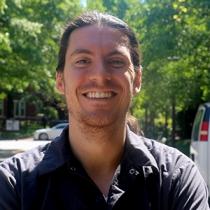
Matthew Chicky
After you graduate, what is your next adventure?
Well, on Wednesday, May 1, I take my last final - Rocket Propulsion. The next day I get married (Ray Munden). On Friday, I graduate with my master's degree in aerospace engineering from Georgia Tech. And on Saturday I will go on my honeymoon to Cancun.
(pause)
When I get back, we'll be moving to Utah where we'll have a few weeks to hike around and enjoy nature before I start my job as a performance analyst in the internal ballistics group of Northrop Grumman
What about your next adventure are you most looking forward to?
We're really excited to move to Utah. I love the outdoors -- camping and hiking - and some of the best national parks are fortunately out there. A big factor influencing my decision was my boss at Northrop Grumman - I worked for him last summer and he really recognized the effort I put into my education at Tech and my passion for the subject itself. The group I'll be working with [at Northrop Grumman] is also wonderful. Great people. Beyond that, I met my boss's boss, his boss, and a couple others besides...everyone I met was really impressive, so I don't think there will be any surprises.
Did you have any previous co-op, internship, or research experience in this area?
I think the AE School gave me more in this area than any other grad student. I'm not speaking about research - I was never a paid GRA - but I did have the chance to work as a teaching assistant (TA) downstairs in the AE Machine Shop for three semesters. And they were the happiest three semesters of my life. Stressful, yes, but the chance to work with three professionals - Greg, Red, and Scott, was exactly what made the difference for me.
I also got the chance to work with another grad student [Casey Wilson] to organize Georgia Tech's first team submission for the Spaceport America Cup. We'd both been on SAC teams at our schools as undergraduates, and we both wanted to work with undergrads here so they could have the same experience. I wanted to communicate the importance of understanding what machines contribute. It's a nuanced field where engineers can only gain an appreciation for that relationship by doing it. Engineers design an assembly with a certain tolerance level in mind, but until they see first hand how it all gets machined, they will go under the assumption that it's easy to build. It's not.
With the SAC team, we had loads of students come into the AE Machine Shop and learn how things are done. When they encountered a problem, they solved it by working with Greg, or Scott. And that's how they learned. Everyone who worked on the SAC came back again and again.
How did your educational experience at Georgia Tech help you to achieve your goals?
My experience at Tech has been so perfect. So many things have fallen into place in just a year-and-a-half.
I was looking to learn more about rocket propulsion systems when I got here. The ultimate goal was to gain the skills and knowledge that would help me get a job in rocket propulsion. That's exactly what I'm about to do, but the way I got here is all about Tech.
I had applied for the same job in Utah [at Orbital ATK, now Northrop Grumman] when I graduated with my undergraduate degree in mechanical engineering. I didn't get it -- they hire summer interns well before the end of the school year -- but I wanted it so much that I drove out to Utah for the summer anyway. I love the outdoors, so I figured I'd enjoy the summer out there before grad school at Tech. When I came to Tech, I went to the AE Fall Career Fair and talked with an engineer who was visiting from the Utah office. I showed him photos of my work in the machine shop and talked to him a bunch. That got me a summer internship. And the summer internship got me the job. The guy I talked to at that career fair will be sitting two cubicles down from me at work.
You don't pass along everything you know in one lifetime, but what I learned at the Machine Shop at Tech solidified the respect I have for my [late] grandfather, Phil Patterson who was a machinest. The fact that I was able to bring his tools to the AE Machine Shop to work on my grad school projects meant a lot to me. I might be studying to become an engineer, but the scale I had in my pocket was my grandfather's. Every time I used it, it gave me a chance to think about my grandfather. My ambition, now, is to be an engineer during the week, a machinest on the weekend.
What advice would you give to an underclassman who would like to follow the same path?
Follow your gut with regard to research programs and assistantships. I did a non-thesis master's degree, so I had a little more freedom to cut my own path. I had a computer and a desk in a professor's lab, but I found myself in the AE Machine Shop almost all the time. It's where I needed to be. I even spent my free time there. And I really wanted to use my skills to help form a team for the SAC competition, so I worked closely with the undergrads who needed to be taught skills in the machine shop. All of this because I determined what I truly wanted and then kept my eye on it.